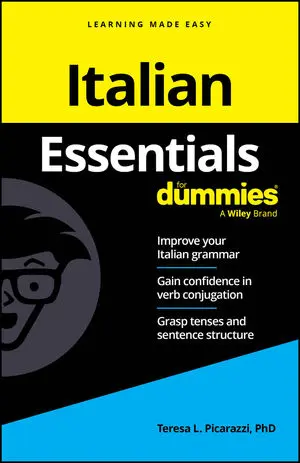Definite and indefinite articles, and the partitive
In Italian, articles vary in gender, number, and spelling. They’re the best predictor of a noun’s gender. The following table outlines the two types of articles and the partitive, and their variations.
| Gender/Number | Definite (the) | Indefinite (a, an) | Partitive (a little, some, any; [preposition di + definite article]) |
| m sing. | il/lo/l’ | uno/un | del/dello/dell’ |
| f sing. | la/l’ | una/un’ | della/dell’ |
| m pl. | i/gli | — | dei/degli |
| f pl. | le | — | delle |
Personal pronouns
Personal pronouns in Italian serve the same purpose as in English. Italian has some pronouns that English doesn’t have, though: stressed and reflexive pronouns.
| Person | Subject | Direct Object | Indirect Object | Stressed | Reflexive |
| 1st sing. | io | mi | mi | Me | mi |
| 2nd sing. | tu | ti | ti | Te | ti |
| 3rd sing. | lui/lei/Lei | lo/la/la | gli/le/Le | lui/lei/Lei | si |
| 1st pl. | noi | ci | ci | Noi | ci |
| 2nd pl. | voi | vi | vi | Voi | vi |
| 3rd pl. | loro | le/li | gli | loro | si |
Simple prepositions
Italian has eight basic prepositions (amongst many), which correspond to the basic prepositions used in English. Remember, though, that although the translations shown here reflect the meanings in each language, the usage sometimes differs between the two languages, depending on context.
The basic prepositions are as follows; I’ve put a star by the ones that are typically — but not always! — contracted with a definite article:
- di* (of, about, some, possession)
- a* (at, to)
- da* (from, by, at)
- in* (in, into, to)
- con (with)
- su* (on, onto)
- per (for, through)
- fra/tra (between, among)
Tenses in Italian
This section provides you with samples of the tenses included in the book.
Modo indicativo (indicative mood)
| Modo Indicativo (Indicative Mood) Tenses | Example Using guardare (to look/to watch) |
| presente (simple present) | Io guardo. (I look/I’m looking/I’m watching/I do watch.) |
| presente progressivo (present progressive) | Io sto guardando. (I‘m looking./I’m watching |
| imperfetto (imperfect) | Io guardavo. (I looked/I was watching.) |
| imperfetto progressivo (past/imperfect progressive) | Io stavo guardando. (I was looking.) |
| passato prossimo (present perfect) | Io ho guardato. (I have looked/I did look.) |
| trapassato prossimo (past perfect) | Io avevo guardato (I had looked.) |
| futuro (future) | Io guarderò. (I will look.); infinitive stem |
| Future anteriore (future perfect) | avrò guardato (I will have looked/watched.) |
Modo condizionale (conditional mood): Infinitive Stem + –ei, –esti, –ebbe, –emmo, –este, –ebbero
| Tense | Example Using guardare (to look/watch) |
| presente (present) | Io guarderei. (I would look/watch.) |
| passato (past) | Io avrei guardato. (I would have looked.) |
Modo imperativo (imperative mood)
| Subject Pronouns | Example Using guardare (to look/to watch) |
| Tu | Guarda! ([You] look!) |
| Lei (you, formal) | Guardi! ([You] look!) |
| Noi | Guardiamo! ([We] Let’s look!) |
| Voi | Guardate! ([You all] look!) |
| Loro (plural; you, formal) | Guardino! [You] look!) |
Modo participio (participle)
| Infinitive Ending | Participle Ending | Example Infinitive | Example Participle |
| –are | –ato | guardare (to watch) | guardato (watched) |
| –ere | –uto | ripetere (to repeat) | ripetuto (repeated) |
| –ire | –ito | finire (to finish/to end) | finito (finished/ended) |
| Irregular | Irregular | dire (to say/to tell) | detto (said/told) |
Modo gerundio (gerund)
| Infinitive Ending | Gerund Ending | Example Infinitive | Example Gerund |
| –are | –ando | guardare (to look) | guardando (looking) |
| –ere | –endo | ripetere (to repeat) | ripetendo (repeating) |
| –ire | –endo | dormire (to sleep) | dormendo (sleeping) |






